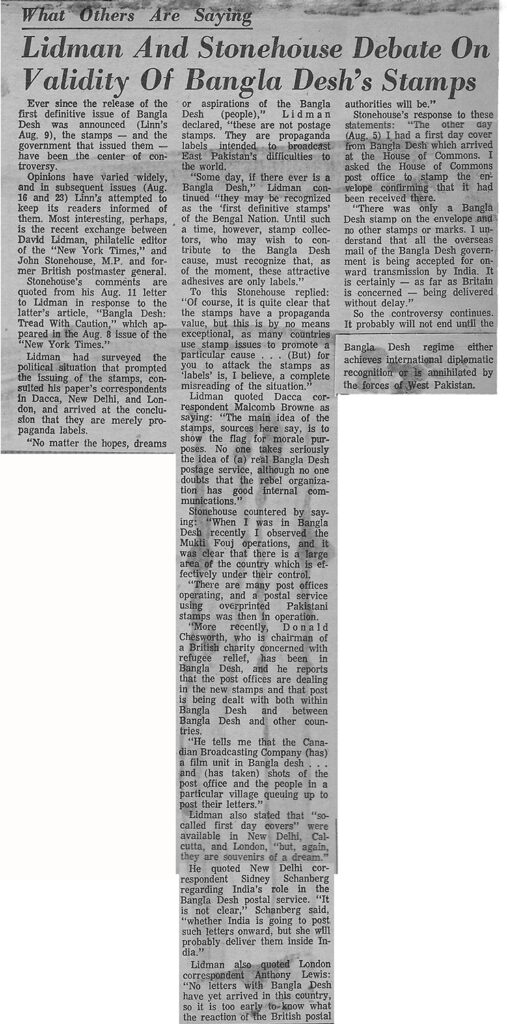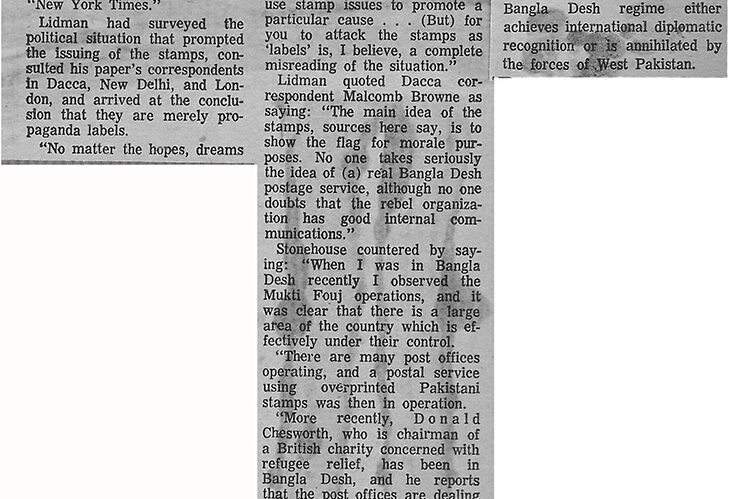ARTICLE: Linn’s Stamp News (20 Sept. 1971)

Lidman and Stonehouse Debate On Validity of Bangla Desh's Stamps
Ever since the release of the first definitive issue of Bangla Desh was announced (Linn's Aug. 9), the stamps --- and the government that issued them --- have been the center of controversy.
Opinions have varied widely, and in subsequent issues (Aug. 16 and 23) Linn's attempted to keep its readers informed of them. Most interesting, perhaps, is the recent exchange between David Lidman, philatelic editor of the "New York Times," and John Stonehouse, M.P., and former British postmaster general.
Stonehouse's comments are quoted from his Aug. 11 letter to Lidman in response to the latter's article, "Bangla Desh: Tread With Caution," which appeared in the Aug. 8 issue of the "New York Times."
Lidman had surveyed the political situation that prompted the issuing of the stamps, consulted his paper's correspondents in Dacca, New Delhi, and London, and arrived at the conclusion that they are merely propaganda labels.
"No matter the hopes, dreams or aspirations of the Bangla Desh (people)," Lidman declared these are not postage stamps. They are propaganda labels intended to broadcast East Pakistan's difficulties to the world.
"Some day, if there ever is a Bangla Desh," Lidman continued, "they may be recognized as the 'first definitive stamps' of the Bengal Nation. Until such a time, however, stamp collectors, who may wish to contribute to the Bangla Desh cause, must recognize that, as of the moment, these attractive adhesives are only labels."
To this Stonehouse replied: "Of course, it is quite clear that the stamps have a propaganda value, but this is by no means exceptional, as many countries use stamp issues to promote a particular cause . . . (But) for you to attack the stamps as 'labels' is, I believe, a complete misreading of the situation."
Lidman quoted Dacca correspondent Malcomb Brown as saying: "The main idea of the stamps, sources here say, is to show the flag for morale purposes. No one takes seriously the idea of (a) real Bangla Desh postage service, although no one doubts that the rebel organization has good internal communications."
Stonehouse countered by saying: "When I was in Bangla Desh recently I observed the Mukti Fouj operations, and it was clear that there is a large area of the country which is effectively under their control.
"There are many post offices operating, and a postal service using overprinted Pakistani stamps was then in operation.
"More recently, Donald Chesworth, who is chairman of a British charity concerned with refugee relief, has been in Bangla Desh, and he reports that the post offices are dealing in the new stamps and that post is being dealt with both within Bangla Desh and between Bangla Desh and other countries.
"He tells me that the Canadian Broadcasting Company (has) a film unit in Bangla desh . . . and (has taken) shots of the post office and the people in a particular village queuing up to post their letters."
Lidman also stated that "so-called first day covers" were available in New Delhi, Calcutta, and London, "but, again, they are souvenirs of a dream."
He quoted New Delhi correspondent Sidney Schanberg regarding India's role in the Bangla Desh postal service. "It is not clear," Schanberg said, "whether India is going to post such letters onward, but will probably deliver them inside India."
Lidman also quoted London correspondent Anthony Lewis: "No letters with Bangla Desh have yet arrived in this country, so it is too early to know what the reaction of the British postal authorities will be."
Stonehouse's response to these statements: "The other day (Aug. 5) I had a first day cover from Bangla Desh which arrived at the House of Commons. I asked the House of Commons post office to stamp the envelope confirming that it had been received there.
"There was only a Bangla Desh stamp on the envelope and no other stamps or marks. I understand that all the overseas mail of the Bangla Desh government is being accepted for onward transmission by India. It is certainly --- as far as Britain is concerned --- being delivered without delay."
So the controversy continues. It probably will not end until the Bangla Desh regime either achieves international diplomatic recognition or is annihilated by the forces of West Pakistan.
© Linn’s Stamp News, Sidney, Ohio, USA. Linns.com. Reproduced with permission.

